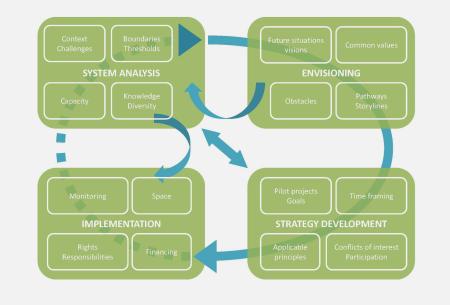
Resource description:
Methodology for planning and realising inclusive local transition activities.
Author/Contact:
TURAS
Expert contact: Eva-Maria Stumpp
Requirements:
- All departments relevant to urban challenges can participate in the transition process.
Advantages:
- The 4-Corner model helps to structure transition activities by guiding the participating actors through a comprehensive process that includes 1) a systemic analysis of the local urban situation, 2) vision formulation, 3) strategy building and 4) the devel
- The 4-Corner model supports comprehensive system analysis by providing an overview of concrete steps to generate, collect and integrate different types of knowledge. It supports inclusive vision building processes by providing a detailed roadmap for stake
- Main outcomes:knowledge/data, stakeholder integration, process innovation, community empowerment.
Constraints:
- Without a structured process that acknowledges and successfully negotiates the complexity of social-ecological systems (including diverse actors and their interests), transition activities often fail to achieve a balance between the different dimensions o
Uses of this resource:
While many current transition initiatives aim for the development of holistic solutions through stakeholder involvement, the interface between two alternative approaches is still underdeveloped: one the one hand, there are descriptive and analytical approaches that tend to rely on expertise in specialised fields. On the other hand, we see normative approaches acknowledging the need to negotiate conflicting goals and interests. In order to be successful, transition initiatives should integrate the virtues of both analytical and normative approaches.
Additional information:
WHO SHOULD BE INVOLVED?
FACILITATORY (PUBLIC) BODIES:
strategic planning department; community development department; planning and development department
LOCAL TASK FORCE:
local or regional authority; community group; professional expert
SUITABLE FOR:
urban region; (sub)urban communities
MAIN NECESSARY RESOURCES ARE:
expert knowledge; local knowledge; institutional set-up; legal legitimization
Licence:
- Free, no licence
Development stage:
- Full, working product